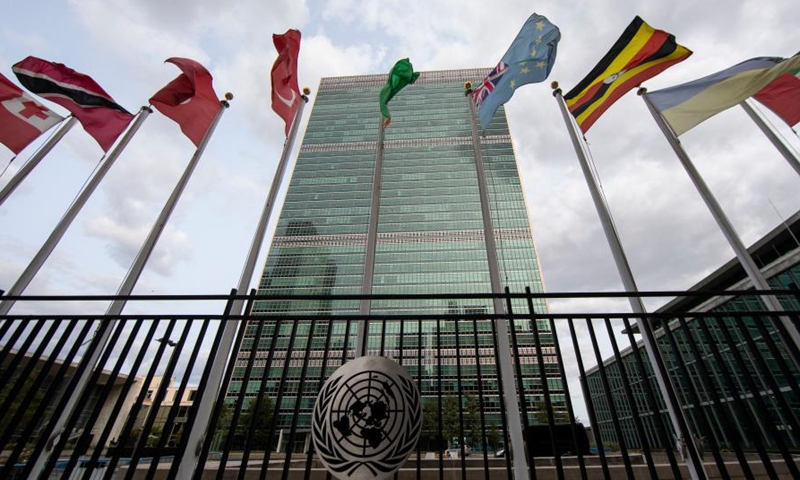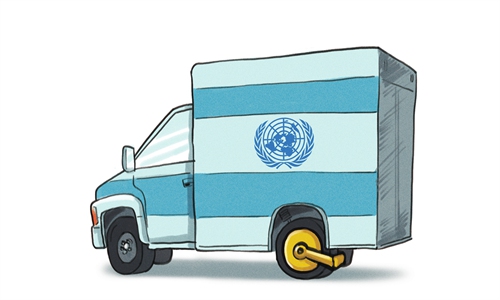
Photo taken on Sept. 14, 2020 shows the outside view of the United Nations headquarters in New York, the United States. Photo: Xinhua
It has been 75 years since the founding of the United Nations (UN) in San Francisco in 1945. Perhaps the most important institution to emerge from the devastation of the World War II, the UN was the brainchild of former US president Franklin Roosevelt who really did indeed "hate war." He wanted to create a forum in which nations could gather as equals in order to discuss controversial issues and avoid going to war, but strong enough to take action if there were a threat of war. This was the work Roosevelt hoped to follow up when the war was over.
We have to say that the venture was very successful. While we have had numerous small wars in the interim (often due to US presidents who didn't "hate war"), but we have so far avoided a conflict between major powers. And during the Cold War, the UN often served as a "safety valve" to maintain discussions between the US and the Soviet Union when the bilateral mechanisms fell apart. And in the era of nuclear weapons, this task has become all the more urgent.
This year, the world is more divided than it has ever been since the demise of the Cold War. And the growing tensions between the US and China as well as the US and Russia have led to all too many "close encounters" at sea and in the air. Under present conditions, a serious incident could quickly lead to a major conflict between nuclear powers. Tensions have got to be brought down - and quickly.
Roosevelt proposed for this purpose the creation of a Security Council, which was composed of the major powers - the US, China, Soviet Union, Great Britain, and France. He felt that if peace could be maintained between these five countries, their unity might provide stability to maintain peace for the world as a whole.
Recently Russian President Vladimir Putin wisely proposed that the five permanent members of the Security Council hold a meeting on the occasion of this year's General Assembly to deal with the major tensions the world is being confronted with. This proposal has been fully supported by China. But, as of now, the US president has remained non-committal. Any major incident arising from the daily "close encounters" could change the calculus. Such a meeting, however, could go a long way in bringing the world off the course toward a conflict on which it is now heading.
The UN has played a major role in many fields, other than peace-keeping or peace-making. And China has emerged as a major force in bringing to the table new ideas for the UN to work on. Two of China's major initiatives - its successful campaign to alleviate poverty in China and the Belt and Road Initiative, which has reinvigorated the development thrust in Asia, Africa, and Latin America - have had a tremendous significance and have been fully supported by the UN.
Unfortunately, US administrations (both Democratic and Republican) for several decades have been acting more like the "rule-givers" than "partners" with the other major powers. In 1997 this assumption was formalized by the Project for the New American Century, which was established by neoconservative pundits and which set forth a program based on the notion the US should assert "a benevolent global hegemony." And most administrations since then have followed that course.
The rise of China, now having become the veritable engine of the world economy, has presented a problem to this outlook. As one of the world's major powers and a member of the Security Council, China rightfully expects to have a say in the shaping of the world order going forward, in particular since that "world order" has been anything but fair to the many developing countries still stuck in poverty. This economic model has proven to be ridden with potential crises.
And it is because of this attitude that the US has proven more obstructive than constructive recently in its work in the UN. Some American scholars go so far as to propose the US abandon the UN entirely. But this is highly unlikely given the importance of its institutions in maintaining peace in some very dangerous parts of the world. We cannot go back to the "geopolitics" of the 19th century in this nuclear age. We certainly can't go back to the era of the British Empire, which, unfortunately, many American political scientists and politicians find so attractive. I think the spirit which moved Roosevelt to create the UN still lives on in many Americans.
We just need a broader dialogue of cultures, and more, not less, cultural and educational exchanges between nations in order to understand the real motivations and desires of other countries. This is the only way to avoid misunderstandings that could easily lead to war. And, in that task, the forum provided by the UN is the ideal place to start.
The author is a Washington-based political analyst and a non-resident fellow of the Chongyang Institute for Financial Studies, Renmin University of China. opinion@globaltimes.com.cn

